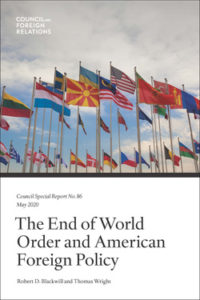 Alongside the Cold War conflict with Soviet Russia, COVID-19 is “one of the two greatest tests of the U.S.-led international order since its founding,” according to Robert D. Blackwill, Council on Foreign Relations (CFR) senior fellow, and Thomas Wright, Brookings Institution senior fellow. “Nothing else since that time approaches the societal, political, and economic effects of the virus on populations around the world.”
Alongside the Cold War conflict with Soviet Russia, COVID-19 is “one of the two greatest tests of the U.S.-led international order since its founding,” according to Robert D. Blackwill, Council on Foreign Relations (CFR) senior fellow, and Thomas Wright, Brookings Institution senior fellow. “Nothing else since that time approaches the societal, political, and economic effects of the virus on populations around the world.”
“With COVID-19, the reordering moment is here,” Blackwill and Wright conclude. “Avoiding dangerous confrontations with rivals is possible, but only if the United States is up to that diplomatic challenge, based on U.S. national interests and democratic values,” they write in a new Council Special Report, The End of World Order and American Foreign Policy.
“The United States should rebuild the core coalition of like-minded liberal democratic states as it did in the late 1940s, though with somewhat less military emphasis, and increase that partnership’s resilience to solve the new challenges that free societies face,” they add. “However, there would be at least one significant difference to the early days of the Cold War before détente: recognizing interdependence, this bloc should seriously engage its rivals and competitors, particularly on shared challenges such as climate change, nuclear proliferation, pandemics, international terrorism, genocide, and the global economy.”
The authors argue that world order “weakened after 9/11 and ended over the past decade, driven by a combination of great power ambition, American withdrawal, and transformational changes that left many nations unmoored from old certainties.” Offering a roadmap for U.S. foreign policy in the face of “radical international uncertainty,” they argue that the United States should
- “create a persuasive model of competent U.S. governance, which will in turn reinforce America’s international leadership;”
- “revitalize North American collaboration;”
- “fundamentally reform the way the United States deals with its treaty allies and partners;”
- “increase ambitions with Europe;”
- “strengthen relations With India;”
- “invest in international institutions;”
- “condition engagement with Russia;”
- “reduce involvement in the Middle East;”
- “stop deterioration in the balance of power with China;”
- “compete with China” but “compartmentalize transnational challenges such as climate change, pandemics, and international terrorism;” and
- “work with other countries so that the rebuilding of national economies is consistent with maintaining an open and mutually beneficial global economy.”







